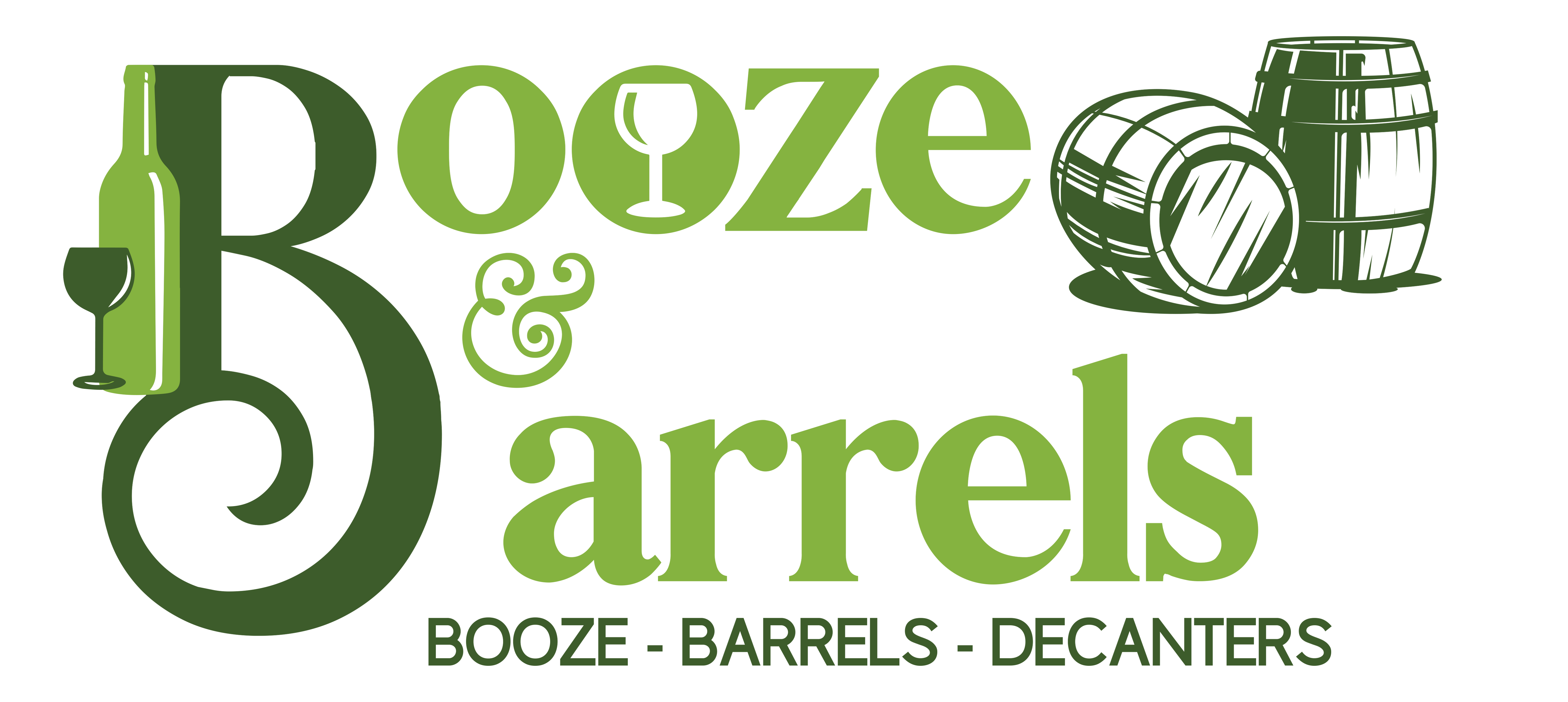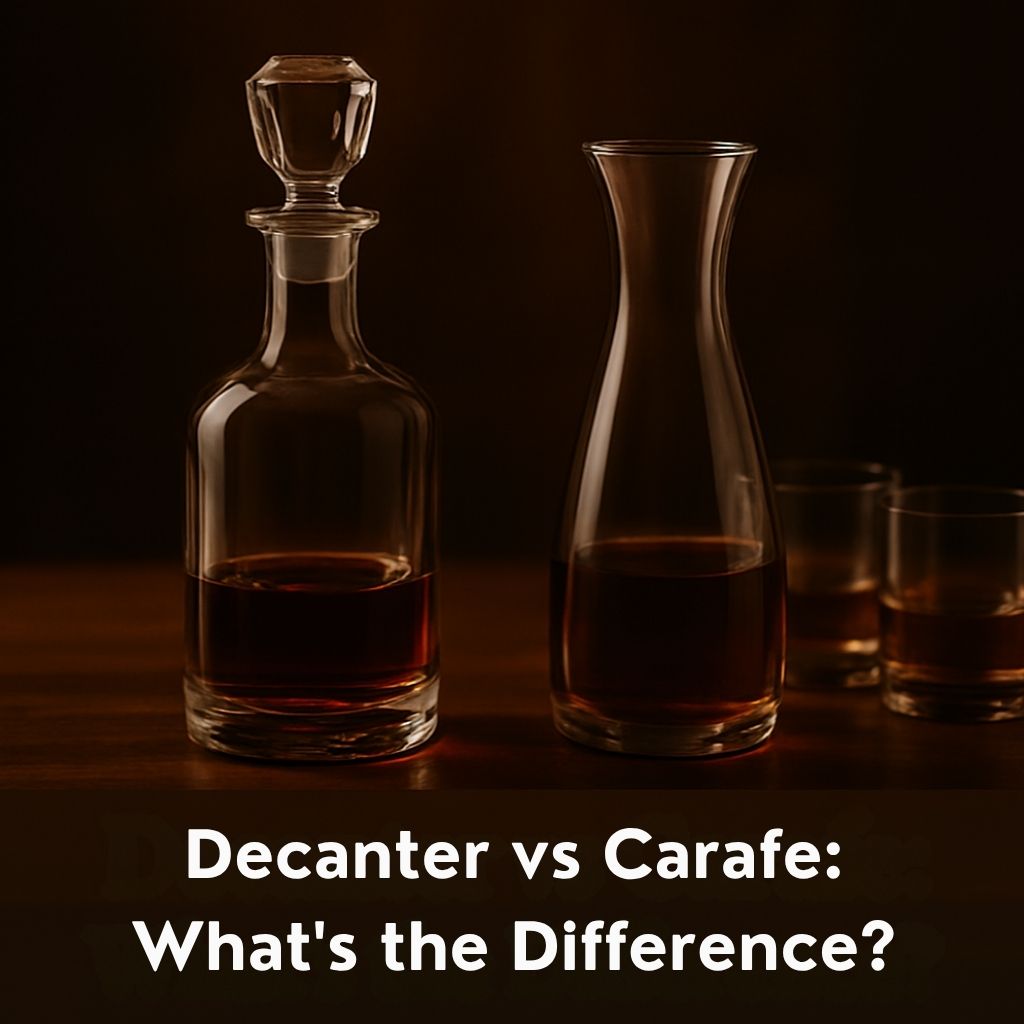
What Alcohol Should You Put in a Decanter?
Decanters are more than ornamental glassware - they’re a symbol of hospitality and good taste. At Booze & Barrels, we’ve built our reputation as Australia’s leading supplier of luxury decanters and oak barrels, and we’re passionate about helping you enjoy your favourite tipple in style. Whether you’re contemplating a crystal whiskey decanter for your home bar or a rustic personalised oak barrel, knowing which drinks belong in them is essential. This guide combines research from leading drink experts and insights from our own customers to answer the question: what alcohol should be in a decanter?
Why Use a Decanter?
Before deciding what to decant, it helps to understand why decanters exist. Wine lovers have long used decanters to separate sediment and allow wine to breathe. Distilled spirits don’t need oxygenation, yet pouring them into a decanter remains popular for three reasons:
- Presentation. Food and lifestyle experts note that spirits are less reactive to oxygen than wine, so decanting them will not change the flavour. Instead, a decanter unifies the look of your bar by replacing mismatched bottles with elegant.
- Protection. An airtight stopper protects the liquid from dust and oxidation. This becomes crucial when spirits are stored for months.
- Conversation. A decanter becomes a centrepiece. Whisky enthusiasts say beautiful glass vessels serve as an icebreaker and invite guests to discuss the drink.
At Booze & Barrels, we offer a wide range of unique vessels - from classic crystal designs to a high heel decanter or a playful skull decanter - so there’s a decanter to suit every personality. Now let’s explore which drinks belong in them.
Spirits That Love a Decanter
Whisky and Bourbon
Whisky is the spirit most closely associated with decanters, and for good reason. Guides from lifestyle experts list whisky, bourbon and rye among the most common spirits poured into a decanter. Moving whisky from bottle to decanter doesn’t radically alter the flavour, but it enhances the experience. A whisky decanter set consisting of a hand‑blown decanter and matching glasses adds theatre to every pour and protects your dram from dust and sunlight.
Our Don Vassie collections include traditional shapes as well as novelty options such as a miniature oak barrel, a football‑shaped decanter and even a gun decanter for the adventurous. For an extra special gift, consider a personalised decanter engraved with a name or message.
Scotch and Rye
Scotch, rye and other grain whiskies benefit from the same treatment. Advanced Mixology notes that Scotch and rye belong on the list of spirits suitable for decanting. While aeration won’t soften the bite as it does with wine, transferring the whisky to a decanter with an airtight stopper keeps it fresh for months. Remember that clear crystal isn’t just about looks; it allows you to admire the amber hue of your Scotch before sipping.
Brandy and Cognac
Brandy, cognac and Armagnac are distilled from grapes and often aged for years, so they develop complex aromas that reward gentle breathing. Popular guides list them among the spirits commonly decanted.
A curvaceous decanter allows the spirit to open up, releasing notes of dried fruit and spice. Avoid lead crystal, however - experts warn that lead can leach into spirits over time. Instead, choose lead‑free crystal whiskey decanter sets or our Wooden Decanters Box sets, which blend timeless elegance with safety.
Rum and Tequila
While rum and tequila don’t require decanting, lifestyle editors at Martha Stewart and Yahoo list them among suitable spirits. A decanter offers a decorative way to present these spirits at dinner parties, particularly aged rum or añejo tequila, where caramel hues deserve to be displayed. Our globe decanter with matching glasses is a favourite for rum lovers who appreciate nautical flair.
Vodka and Gin
Clear spirits such as vodka and gin also make the cut. They won’t benefit from breathing, but an elegant vessel elevates martini night. Pair your whiskey decanter and glasses with stainless steel wine glasses or chilled martini glasses for a stylish bar set. When entertaining, a decanter makes it easier to mix drinks without wrestling with bulky commercial bottles.
Other Fortified Spirits and Cocktails
Armagnac, port and sherry are often mentioned alongside brandy in decanter guides. Because they are fortified wines, you’ll notice sediment in older bottles. Carefully pour them into a decanter to separate the sediment and allow subtle aromas to shine. Our port barrels and mini personalised oak barrel casks are perfect for ageing tawny port or blending homemade cocktails. You can even batch your favourite cocktail in a barrel or decanter, letting the flavours meld for a unique taste. For inspiration on cocktails, our blog offers a guide on making a whisky sour and tips on preparing wine at home.
Should You Decant Wine?
Wine deserves its own discussion because the goals differ from spirits. Wine professionals often decant to aerate the wine, release aromas and remove sediment. Advanced Mixology recommends decanting young reds such as cabernet sauvignon, pinot noir and malbec. Even some white and rosé wines can benefit from brief aeration. However, there are caveats:
- Time: Unlike spirits, wine should not be stored in a decanter for long periods. Experts warn that wine becomes over‑aerated after a couple of days. Pour it into a wine decanter shortly before serving and finish it the same day. For tips on preserving opened wine, check our article on keeping wine fresh.
- Sediment: Mature red wines and vintage ports often contain sediment. Decanting separates it, improving clarity and mouthfeel.
- Glass shape:Wine accessories such as broad‑bottomed decanters maximise surface area for aeration. Our collection includes classic shapes and unique novelties that double as art pieces.
Our article on storing Champagne reveals why controlling temperature and light matters more than transferring the liquid.
Drinks to Avoid Decanting
Not every beverage belongs in a decanter. Carbonated drinks such as beer, cider and sparkling wine will lose fizz rapidly if decanted. Soft drinks and premixed cocktails with fruit juice can spoil or ferment. Cream liqueurs and herbal bitters also fare better in their original bottles. In general, avoid decanting anything with carbonation or dairy.
What About Age‑Sensitive Spirits?
While most spirits are stable, there are a few cautionary notes:
- Fragile flavours: Some experts advise against decanting extremely old whiskies or rum finished in delicate casks, as exposure to oxygen may fade their top notes. For these, pour directly from the bottle.
- Airtight matters: Spirits last years in a decanter if the stopper is tigh, but prolonged storage (beyond two years) can lead to slight discolouration. Consume your decanted spirits within a year for optimal taste.
- Lead crystal: Lead glass can leach into spirits over time. Our decanters use lead‑free glass, ensuring safety without sacrificing beauty.
Choosing the Right Decanter
The right decanter enhances both the drink and your décor. Here are factors to consider:
- Material: Decanters are typically made of crystal or glass. Advanced Mixology explains that crystal is durable and allows for intricate designs, whereas standard glass has thicker walls and is often dishwasher‑safe. We use borosilicate glass in many designs to resist temperature changes and avoid breakage.
- Size: Match the decanter’s capacity to your drinking habits. For a dinner party, a 750 mL decanter fits a standard bottle of wine or whisky. Our mini barrels hold 1 -5 litres and are ideal for ageing cocktails or small batches.
- Shape: Wines benefit from wide‑bottomed decanters that maximise aeration, whereas spirits are suited to upright shapes with narrow necks. Choose a design that reflects your personality - from classic cut glass to novelty shapes like our globe decanter, skull decanter or gun decanter.
- Functionality: Look for a stopper that fits snugly to prevent evaporation. Many of our decanters come with matching whisky stones gift sets to chill your dram without dilution or with bartender kit tools for mixing cocktails.
Caring for Your Decanter
Proper maintenance keeps your decanter beautiful and your drinks tasting fresh. Here’s how:
- Cleaning: Rinse immediately after use to prevent stains. Use warm water, a mild detergent and a soft brush for stubborn residues. Avoid abrasive scouring pads. Our blog “How to Clean a Decanter the Right Way” provides detailed tips.
- Drying: Air‑dry upside down on a rack or use a lint‑free cloth. Moisture inside the decanter can dilute your next pour or encourage mould.
- Storage: Keep decanters in a cool, dark place away from direct sunlight. Prolonged exposure to heat and light can accelerate evaporation. When storing spirits long term, top up occasionally to minimise air space.
- Replacement: Inspect your decanter for cracks, chips or a loose stopper. If you see signs of mould or discoloration, empty and clean it thoroughly. If the stopper no longer fits snugly, consider retiring the decanter.
Conclusion
Decanting is part art, part science. Almost any spirit - Whiskey Decanter, bourbon, rye, rum, tequila, brandy, cognac, Armagnac, vodka or gin - can be safely poured into a decanter. The benefits are largely aesthetic and practical: an airtight vessel preserves your drink, showcases its colour and adds sophistication to your home bar. Wine, on the other hand, should only be decanted shortly before serving and never stored long term. Avoid decanting carbonated drinks and ensure your decanter is lead‑free.
As a brand built on craftsmanship and quality, Booze & Barrels invites you to explore our collection of whiskey accessories, wine decanter designs and gift sets. Whether you’re looking for a traditional crystal piece, a whimsical high heel decanter, or a robust barrel for ageing cocktails, we have you covered. Visit our blog for more tips, and raise your glass with confidence - your drink deserves it.


